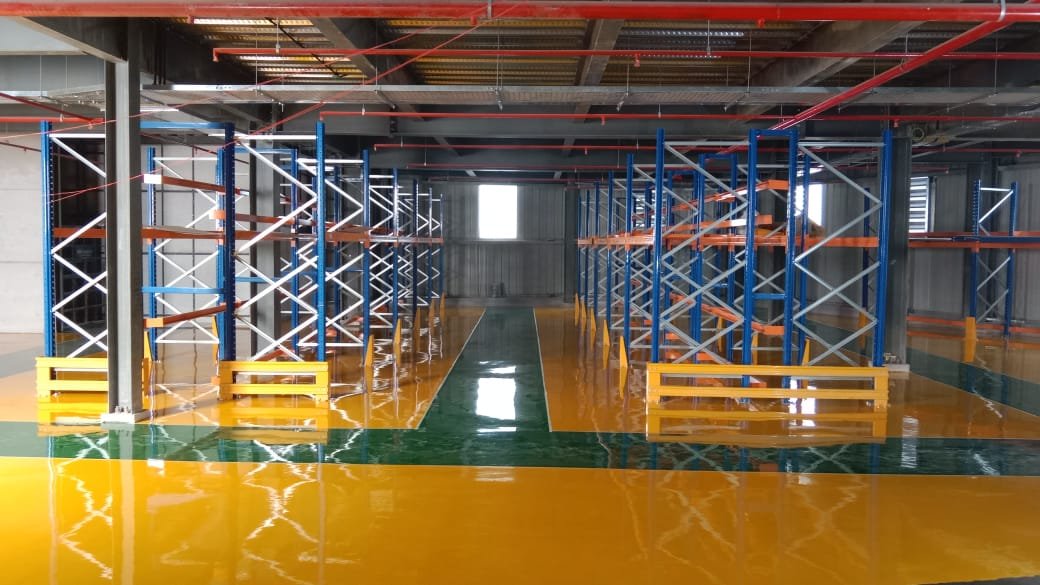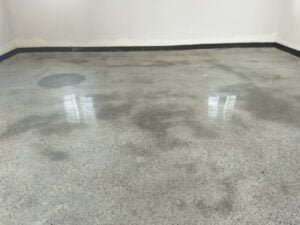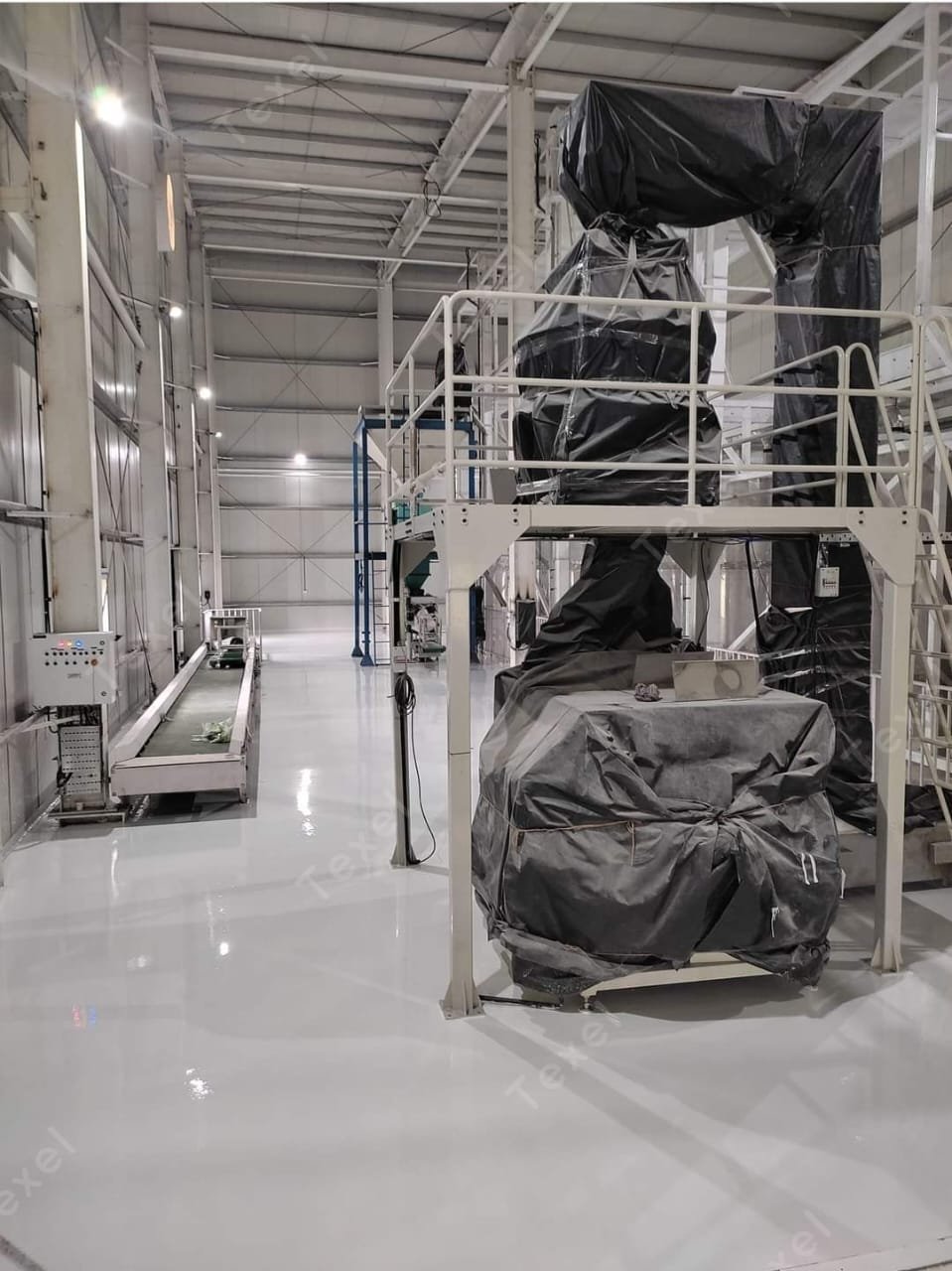REQUIREMENT OF CONCRETE FLOOR IN EPOXY AND CONCRETE POLISHING APPLICATION
REQUIREMENT OF CONCRETE FLOOR IN EPOXY AND CONCRETE POLISHING APPLICATION
TABLE OF CONTENTS
- INTRODUCTION
- EPOXY FLOORING IN A CONCRETE FLOOR
- PROCESS OF INSTALLING EPOXY FLOORING IN A CONCRETE FLOOR
- POLISHED CONCRETE FLOORING
- PROCESS OF APPLYING POLISHED CONCRETE FINISH IN A CONCRETE FLOOR
- CONCLUSION
INTRODUCTION
Concrete floors are a common flooring option in many buildings and homes. Concrete is a durable and strong material that can withstand heavy use, making it a popular choice for high-traffic areas. It is also relatively low-maintenance and easy to clean.
Concrete floors have a rough, matte surface and are often used in industrial settings. Polished concrete floors, on the other hand, have a smooth, glossy surface that can resemble polished stone or marble. Polished concrete floors are often used in commercial and residential settings, particularly in modern and contemporary designs.
EPOXY FLOORING ON A CONCRETE FLOOR
Epoxy flooring is a popular choice for concrete floors in many industrial, commercial, and residential settings. Epoxy is a type of polymer that is applied to the surface of a concrete floor as a liquid, which then hardens into a durable and resilient coating.
While applying epoxy flooring to a concrete floor, there are several requirements that must be met to ensure a successful installation: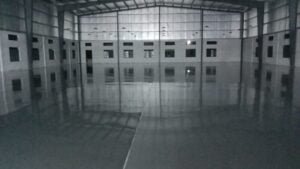
- The concrete floor must be clean and free of debris, oil, grease, and other contaminants. Any dirt or debris on the surface can prevent the epoxy from properly adhering to the concrete.
- The concrete floor should be in good condition, without any major cracks or damage. Any cracks or damage in the concrete must be repaired before the epoxy can be applied.
- The surface of the concrete floor must be properly prepared to promote adhesion of the epoxy coating. This may include mechanical surface preparation methods, such as shot blasting or diamond grinding, to create a rough profile on the surface of the concrete.
- The temperature and humidity of the environment must be carefully controlled during the installation process. The optimal temperature range for epoxy flooring installation is typically between 60°F and 90°F, and the humidity should be kept below 85%.
By meeting these requirements, you can ensure a successful epoxy flooring installation on concrete floor, creating a durable and attractive surface that is resistant to abrasion, chemicals, and stains.
PROCESS OF INSTALLING EPOXY FLOORING ON A CONCRETE FLOOR
When it comes to applying an epoxy coating to a concrete floor, there are several requirements that must be met to ensure a successful installation: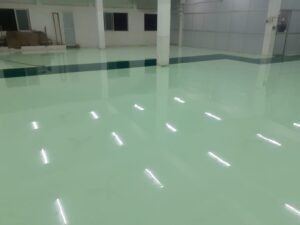
- Surface preparation: The surface of the concrete floor must be properly prepared before applying the epoxy coating. This may include cleaning, degreasing, and removing any existing coatings or sealers. Any cracks, chips, or spalls in the concrete must also be repaired prior to application.
- Moisture content: The moisture content of the concrete floor must be tested and verified prior to installation. If the moisture content is too high, it can cause issues with the adhesion of the epoxy coating and lead to blistering or peeling.
- Temperature and humidity: The temperature and humidity levels of the installation area must be within the recommended range. The optimal temperature range for epoxy application is typically between 60°F and 90°F, and the humidity should be below 85%.
- Concrete condition: The concrete floor must be structurally sound and in good condition. Any major cracks or damage must be repaired prior to application. The surface should be clean, dry, and free of any contaminants or loose particles.
- Application method: The epoxy coating should be applied using the recommended application method, such as roller or squeegee, and should be spread evenly over the surface of the concrete floor.
By meeting these requirements, you can ensure a successful installation of an epoxy coating on concrete floor, creating a durable, long-lasting surface that is resistant to abrasion, chemicals, and stains.
POLISHED CONCRETE FLOORING
Polished concrete flooring is another popular choice for concrete floors, particularly in commercial and residential settings. Unlike epoxy flooring, polished concrete flooring involves mechanically grinding and polishing the surface of the concrete to create a smooth and glossy finish.
When applying polished concrete flooring to a concrete floor, there are several requirements that must be met to ensure a successful installation: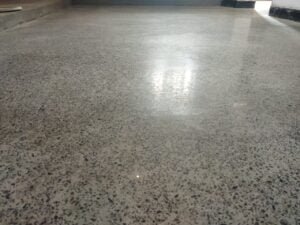
- The concrete floor must be structurally sound and free of major cracks or damage. Any cracks or damage in the concrete must be repaired before the polishing process can begin.
- The surface of the concrete must be clean and free of debris, oil, grease, and other contaminants. Any dirt or debris on the surface can prevent the polishing process from achieving a smooth and even finish.
- The surface of the concrete must be flat and level, with no major high or low spots. Any uneven areas must be ground down to create a smooth and consistent surface.
- The hardness of the concrete must be appropriate for the polishing process. If the concrete is too soft, it may not be able to achieve the desired level of glossiness. If it is too hard, it may be difficult to grind and polish.
- The environment must be carefully controlled during the polishing process. The temperature and humidity should be maintained within a certain range to ensure optimal results.
By meeting these requirements, you can ensure a successful installation of polished concrete flooring on concrete floor, creating a smooth and glossy surface that is durable, low-maintenance, and aesthetically pleasing.
PROCESS OF APPLYING POLISHED CONCRETE FINISH IN CONCRETE FLOOR
When it comes to applying a polished concrete finish to a concrete floor, there are several requirements that must be met to ensure a successful installation:
- Concrete hardness: The concrete floor must have a sufficient level of hardness to be suitable for polishing. The concrete’s hardness is typically measured using a Mohs scale, and the recommended minimum hardness is around 7-8 on this scale.
- Surface preparation: The surface of the concrete floor must be properly prepared before polishing. This may include grinding, honing, and polishing to achieve a smooth and even surface. Any cracks or damage in the concrete must be repaired prior to polishing.

- Moisture content: The moisture content of the concrete floor must be tested and verified prior to polishing. If the moisture content is too high, it can cause issues with the polishing process and lead to a less-than-desirable finish.
- Concrete condition: The concrete floor must be structurally sound and in good condition. Any major cracks or damage must be repaired prior to polishing. The surface should be clean, dry, and free of any contaminants or loose particles.
- Polishing equipment and abrasives: The right polishing equipment and abrasives must be used for the specific concrete surface to achieve the desired level of finish. The equipment and abrasives will vary depending on the size and type of concrete floor being polished.
By meeting these requirements, you can ensure a successful installation of a polished concrete finish your concrete floor, creating a smooth, glossy surface that is durable, low-maintenance, and aesthetically pleasing.
CONCLUSION
Here, both epoxy flooring and concrete polishing are excellent options for concrete floors. Epoxy flooring is a durable and versatile solution that offers a wide range of design options and can withstand heavy traffic and use. It is also relatively easy to clean and maintain.
Concrete polishing, on the other hand, provides a sleek and modern look to the concrete floor while enhancing its strength and durability. It is also an environmentally-friendly option as it utilizes the existing concrete floor without the need for additional materials.
When deciding between epoxy flooring and concrete polishing, it is important to consider the specific needs and requirements of your space. Epoxy flooring may be better suited for high traffic areas such as industrial spaces, garages, or hospitals, while concrete polishing may be a better fit for commercial spaces such as offices or retail stores.
In any case, both epoxy flooring and concrete polishing require concrete floor with proper preparation and application by a professional to ensure a long-lasting and high-quality finish.
We at Texel Agency will help you to achieve best in class Epoxy Flooring and Concrete Polishing on your Concrete Floor . We do help you to lay all Epoxy flooring, PU flooring & concrete polishing
Texel agency is one of the best Epoxy Flooring and Concrete Polishing contractors in Coimbatore. Our Epoxy Flooring and Concrete Polishing price is very optimum with best quality.
Texel Agency is also one of the best epoxy flooring applicators in Coimbatore. Our Epoxy flooring service is being extended to all over South India.
Our Epoxy Flooring service is being given in important cities like Coimbatore, Chennai, Bangalore, Hosur, Madurai, Thiruvananthapuram, Kochi & Calicut. Our Epoxy flooring service is being given at very optimum price.
Please call us for the best Industrial flooring solution,
Leave a Reply
You must be logged in to post a comment.

